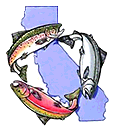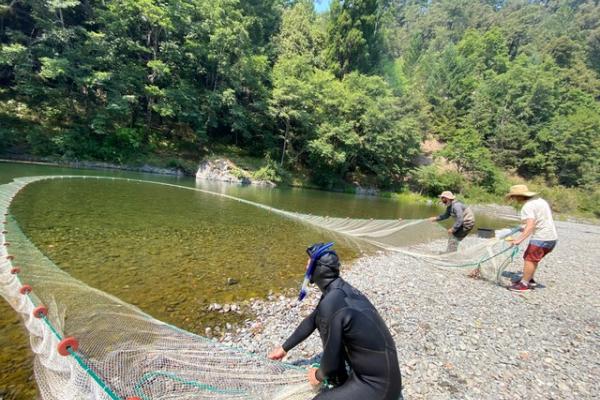Reconnecting with Resilience
April 19 - 22, 2022
Managing Non-native Predatory Fish in California’s Salmon Bearing Streams
22 April 2022
9:00am - 12:15pm
Session Coordinators: Dr. Philip Georgakakos, UC Berkley; Dr. Gabriel Rossi, UC Berkeley, and Abel Brumo, Stillwater Sciences
Ordering and prioritizing recovery actions for California’s endangered salmon and steelhead is a dizzying challenge. Instream flow, habitat alteration, genetic bottlenecks, and hatchery management each have a claim as a priority for our attention and recovery dollars. In this pantheon of insults to native salmonids, the effects of invasive predatory fish are sometimes assumed to be an unavoidable and unmanageable reality of California’s modern landscape. However, non-native predatory fish are affecting the survival, distribution, abundance, and life history patterns of native salmonids. And the impacts of many non-native predatory fish are increasing with climate change. Here we seek to look deeper at the types of interactions between non-native predatory fish and native salmon in California, their ecological implications for salmon recovery, and management tools to reduce the effects of non-native predatory fish on native salmonids.
River ecosystems contain mosaics of linked food webs. Therefore managers must carefully consider both the immediate and cascading effects of actions which remove predators or alter predator-prey dynamics. But given the critical state of our salmon populations it is necessary to make these considerations now, and carefully weigh the benefits and risks of different approaches. This session will include talks on the ecology of interactions between non-native predatory fish and Pacific Salmon, the success and failures of methods to manage non-native predatory fish in salmon-bearing streams, and novel and traditional management strategies for the future. The session will conclude with a round table discussion on how to proceed with the management of non-native predatory fish in California’s salmon-bearing streams.
Landscape-scale and Habitat-level Drivers of Fish Predation in the Sacramento-San Joaquin Delta, Cyril Michel, NOAA
River ecosystems contain mosaics of linked food webs. Therefore managers must carefully consider both the immediate and cascading effects of actions which remove predators or alter predator-prey dynamics. But given the critical state of our salmon populations it is necessary to make these considerations now, and carefully weigh the benefits and risks of different approaches. This session will include talks on the ecology of interactions between non-native predatory fish and Pacific Salmon, the success and failures of methods to manage non-native predatory fish in salmon-bearing streams, and novel and traditional management strategies for the future. The session will conclude with a round table discussion on how to proceed with the management of non-native predatory fish in California’s salmon-bearing streams.
Landscape-scale and Habitat-level Drivers of Fish Predation in the Sacramento-San Joaquin Delta, Cyril Michel, NOAA
Spring Temperature Predicts Upstream migration Timing of Invasive Sacramento Pikeminnow in a Salmon-bearing River, Philip Georgakakos, UC Berkeley
Shade Affects Magnitude and Tactics of Juvenile Chinook Salmon Antipredator Behavior, Megan Sabal, Oregon State University
Tracking (and Trying to Stop) the Invasion of Sacramento Pikeminnow in the North Fork Eel River, Zane Ruddy, BLM
Pikeminnow Suppression: A Big Success in a Small Watershed, Ken Jarrett, Stillwater Sciences
Informing Management Strategies for Non-native Salmonid Predators Through Applied Ecological Studies: Lessons Learned from the Stanislaus River, Matthew Petersen, FISHBIO

